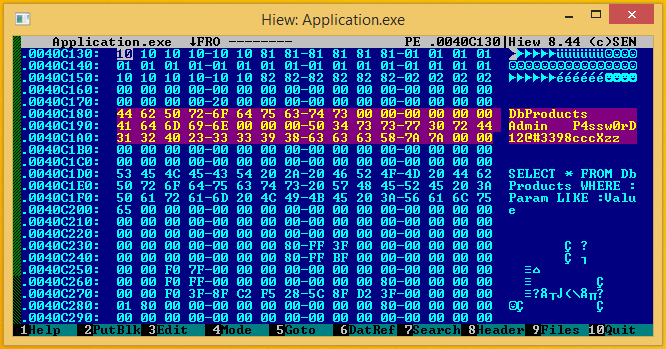String Encryption & File Encryption for Developers
Encrypt strings in source code & files using randomly generated algorithms, and generate the corresponding unique decryption code for any supported programming language.
The problem
I'm a developer, I love programming. I'm also an avid reverse engineer. I perform a wide array of software analysis in my daily work and sometimes I find things in compiled applications that shouldn't be exposed to the first person with a simple hex-editor in hand.
What can be found in application binaries?
I've listed a few examples of the things I find below. Sometimes these things shouldn't even be included in applications at all (they are there due to poor design choices or rushed work), but some are just unavoidable.
Why should I care?
If any of these things were to fall into the wrong hands, they could be used to compromise your software or your infrastructure.

Take for example database passwords. They could be used by a competitor to view your database structure or dump all of its contents. You don't want to lose all your hard work just because someone with a simple hex-editor can discover your password in plain text.
The solution — String Encrypt
I decided to create a simple service called String Encrypt for developers, offering fast string & file encryption without the need to write custom encryption tools.
String Encrypt can help you hide the things that shouldn't be visible at first glance to anyone with a hex-editor.
String Encrypt has its own Web API interface that can be used to automate the encryption process, e.g. you could encrypt your sensitive strings before each project build.
How does it work?
I like simplicity and String Encrypt is very simple to use. All you need to do is:
- Enter the label of your string, say "szSecret"
- Enter the string content, for example "Hello"
- Select the output programming language for the decryption code
- Hit the Encrypt and Generate Decryptor button
The result
String Encrypt uses random encryption code for each string and the sample result might look like this for the supported set of programming languages:
- C/C++
- C#
- Delphi / Pascal
- Java
- JavaScript
- Python
- Haskell
- MASM
- FASM
// encrypted with www.stringencrypt.com (v1.0.0) [C/C++]
// szSecret = "Hello World!"
wchar_t szSecret[13] = { 0xB13D, 0xB159, 0xB15F, 0xB160, 0xB168, 0xB11A, 0xB152, 0xB169,
0xB15F, 0xB16A, 0xB14F, 0xB10B, 0xB0F1 };
for (unsigned int fstHM = 0, TLuIA = 0; fstHM < 13; fstHM++)
{
TLuIA = szSecret[fstHM];
TLuIA = ~TLuIA;
TLuIA --;
TLuIA = ~TLuIA;
TLuIA -= 0xA90C;
TLuIA ^= fstHM;
TLuIA += 0xF816;
szSecret[fstHM] = TLuIA;
}
wprintf(szSecret);// encrypted with www.stringencrypt.com (v1.0.0) [C#]
// szSecret = "Hello World!"
String szSecret = "\uFFB6\uFF99\uFF92\uFF92\uFF8F\uFFDE\uFFA7\uFF8F\uFF8C\uFF92\uFF9A\uFFDD";
for (int hcGUs = 0, JBonk = 0; hcGUs < 12; hcGUs++)
{
JBonk = szSecret[hcGUs];
JBonk ++;
JBonk = ~JBonk;
JBonk -= hcGUs;
JBonk += hcGUs;
szSecret = szSecret.Substring(0, hcGUs) + (char)(JBonk & 0xFFFF) + szSecret.Substring(hcGUs + 1);
}
MessageBox.Show(szSecret);// encrypted with www.stringencrypt.com (v1.0.0) [Delphi / Pascal]
var
// szSecret = "Hello World!"
szSecret: array[0..13] of WideChar;
YhZsX: Integer;
XMSIh: Integer;
begin
szSecret[12] := WideChar($421E); szSecret[3] := WideChar($427D);
szSecret[10] := WideChar($427C); szSecret[4] := WideChar($4285);
szSecret[1] := WideChar($4276); szSecret[5] := WideChar($4237);
szSecret[6] := WideChar($426F); szSecret[7] := WideChar($4286);
szSecret[2] := WideChar($427C); szSecret[0] := WideChar($425A);
szSecret[8] := WideChar($428C); szSecret[11] := WideChar($4238);
szSecret[9] := WideChar($4277);
for XMSIh := 0 to 13 do
begin
YhZsX := Ord(szSecret[XMSIh]);
YhZsX := YhZsX xor XMSIh;
YhZsX := not YhZsX;
YhZsX := YhZsX + $4212;
YhZsX := not YhZsX;
szSecret[XMSIh] := WideChar(YhZsX);
end;
ShowMessage(szSecret);// encrypted with www.stringencrypt.com (v1.0.0) [Java]
// szSecret = "Hello World!"
String szSecret = "\uD161\uD14B\uD143\uD144\uD142\uD18E\uD178\uD13F" +
"\uD153\uD14E\uD143\uD181";
for (int PznwK = 0, NKJoC = 0; PznwK < 12; PznwK++)
{
NKJoC = szSecret.charAt(PznwK);
NKJoC -= PznwK;
NKJoC += PznwK;
NKJoC ++;
NKJoC ^= PznwK;
NKJoC += 0x16BF;
NKJoC ^= 0xE869;
szSecret = szSecret.substring(0, PznwK) + (char)(NKJoC & 0xFFFF) + szSecret.substring(PznwK + 1);
}
System.out.println(szSecret);<script type="text/javascript">
// encrypted with www.stringencrypt.com (v1.0.0) [JavaScript]
// szSecret = "Hello World!"
var szSecret = "\uD2B6\uD29C\uD298\uD297\uD2B1\uD309\uD2CB\uD298\uD298\uD2B1\uD2C8\uD302";
for (var cXIBk = 0, fyBrc = 0; cXIBk < 12; cXIBk++)
{
fyBrc = szSecret.charCodeAt(cXIBk);
fyBrc += 0x26EE;
fyBrc ^= 0x0613;
fyBrc = ~fyBrc;
fyBrc += cXIBk;
fyBrc ^= cXIBk;
fyBrc -= cXIBk;
szSecret = szSecret.substr(0, cXIBk) + String.fromCharCode(fyBrc & 0xFFFF) + szSecret.substr(cXIBk + 1);
}
alert(szSecret);
</script># encrypted with www.stringencrypt.com (v1.0.0) [Python]
# szSecret = "Hello World!"
szSecret = [ 0x0046, 0x0061, 0x006E, 0x006C, 0x006D, 0x0020, 0x0055, 0x005F,
0x0070, 0x006C, 0x0066, 0x0021 ]
for WRUGp in range(12):
BMbPZ = szSecret[WRUGp]
BMbPZ += 1
BMbPZ ^= WRUGp
BMbPZ += 1
BMbPZ ^= WRUGp
szSecret[WRUGp] = BMbPZ
szSecret = ''.join(chr(BMbPZ & 0xFFFF) for BMbPZ in szSecret)
del WRUGp, BMbPZ
print(szSecret)-- encrypted with www.stringencrypt.com (v1.0.0) [Haskell]
module Main where
import qualified Data.Char
import qualified Data.Bits
main = do
putStrLn $ szSecret
-- szSecret = "Hello World!"
szSecret = zipWith f [0..] [ 0x751D, 0x753C, 0x7531, 0x7537, 0x753E, 0x754F, 0x7512, 0x753A,
0x7527, 0x7533, 0x7549, 0x7588 ]
where
f pahnq frsop = let wpsnl0 = frsop
wpsnl1 = wpsnl0 `Data.Bits.xor` pahnq
wpsnl2 = wpsnl1 + 1
wpsnl3 = wpsnl2 - pahnq
wpsnl4 = Data.Bits.complement wpsnl3
wpsnl5 = wpsnl4 `Data.Bits.xor` 0x8AA6
wpsnl6 = wpsnl5 + 1
in Data.Char.chr (wpsnl6 Data.Bits..&. 0xFFFF); encrypted with www.stringencrypt.com (v1.0.0) [MASM Assembler (32 bit)]
.data
; szSecret = "Hello World!"
szSecret dw 0D7B3h, 0D799h, 0D791h, 0D792h, 0D798h, 0D7E0h, 0D7B6h, 0D7A1h, 0D791h, 0D7A8h, 0D7A1h, 0D7E7h, 0D807h
.code
mov ecx, offset szSecret
mov eax, 13
sub edx, edx
@@:
mov bx, word ptr [ecx + edx]
add ebx, 02804h
sub ebx, edx
not ebx
add ebx, edx
xor ebx, edx
mov word ptr [ecx + edx], bx
inc edx
dec eax
jne @b
push 0
push ecx
push ecx
push 0
call MessageBoxW; encrypted with www.stringencrypt.com (v1.0.0) [FASM Assembler (32 bit)]
section '.data' data readable writable
; szSecret = "Hello World!"
szSecret dw 09AD0h, 09AF5h, 09AFCh, 09AFCh, 09AF9h, 09A88h, 09AC1h, 09AF7h
dw 09AF6h, 09AFCh, 09AC4h, 09A89h, 06568h
section '.text' code readable executable
mov ebx, szSecret
mov eax, 13
and edx, 0
@@:
mov cx, word [ebx + edx]
xor ecx, 09A97h
xor ecx, edx
inc ecx
add ecx, edx
mov word [ebx + edx], cx
inc edx
dec eax
jne @b
push 0
push ebx
push ebx
push 0
call [MessageBoxW]Overall software protection
String & file encryption will provide you just one layer of protection. You might also be interested in our software protection solution — PELock. It will help you protect your software against experienced reverse engineers & crackers.
Any questions?
If you would like to ask me about the String Encrypt service, or something's not clear, mail me, I'll be happy to help you.





